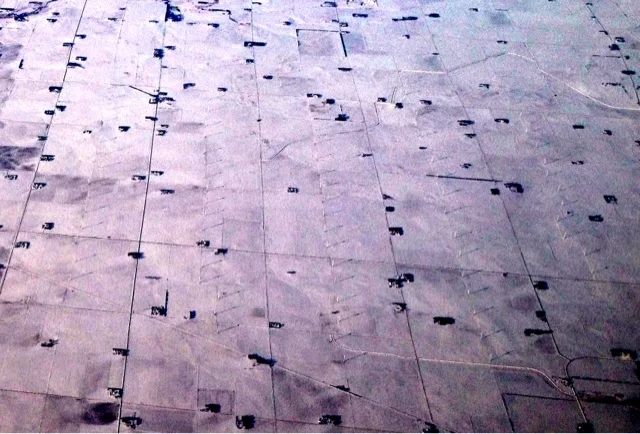On Farm Fracking
Imagine a farm. Do you see an old fashioned windmill? You might. Those old workhorses of farm water pumping have been staples of the American farm scene since the mid-19th century.
Today, farms, particularly those in Iowa but elsewhere too, have been taking advantage of high average winds. Wind farms are often installed on farmlands where they do little to interrupt the practice of farming, take up little space, and as far as I can tell from the towers I've visited, are quiet.
As some of you know, NYS is embroiled in handwringing regarding the institution of horizontal gas drilling using the process of hydraulic fracturing. I need not get into the details here, but suffice to say that it is a process that is heavily dependent on water and chemicals, creates millions of gallons of fluid waste that is salty, radioactive, and chemical laden, creates air pollution in the form of truck traffic, dust, and noxious chemical aerosols from the condensing process, all locally as in -on farm.
Farmers are hurting financially and that is particularly true for dairy farmers in New York State. I cannot blame a farmer for selling the rights to the health of his land for a large lease payment and royalties when so much is not going in his favor. But, at the same time, as a consumer of local farm foods, including dairy, meat, and vegetable, I cannot accept the practice as a solution to our farming problems.
Wind farms and farming are good companions. I do not believe we can solve all our energy problems with wind, but I do believe that wind farms can help sustain farmers. But that should not be all they are doing to grow sustainably. They should be diversifying their product, reaching out to new markets, seeking ways to be more efficient with technology. Government farm bills can be written to aid the smaller farm, and USDA programs for slaughter and packaging could be instituted for the smaller, local, high quality producer. I believe it's time for mid-sized producers of cured artisanal meats and cheeses, adding value to farm produce and feeding the growing interest in local sourcing and high-quality products. Aren't we ready to trade in our Oscar Meyer for la Quercia? We can do this New York, but not if we sell out to immediate gains at future expense.
I will refuse to eat any produce or product that I can reasonably discover is produced on "fracked" land. I know I am not alone on this. We can reasonably assume that fracking on farm land in the southern tier will push up the price of farm land in the Hudson Valley and elsewhere. This will drive up the costs of already higher-priced produce from these regions. The net result, I believe, will be lower consumption of high quality local foods and consequently, less local farming. This is the effect fracking in New York State may have on our access to local, high quality produce, meat, and dairy, to say nothing of the possible pollution of our air, streams, rivers, and estuaries.
Demand to know what the state plans to do when a spill occurs, or flooding rains take out a waste water pond. Demand to know how the waste water will be treated by your local sewage treatment plant discharging into the Mohawk (a Hudson tributary), Susquehanna, or Delaware. Demand to know the safety of drilling waste water brine spread onto your local roads in lieu of road salt (which washes off the road, right?). Demand to know where the millions of gallons of water will come from for drilling. Demand to know who gets priority to water should there be a drought. Demand to know what's coming out of those condenser tanks on your farm.
Yes, we all benefit from cheap gas, in the short term. I do, you do, all of us. Which is why we must get together -we're all in this, to choose another way for the long term health of New York's farmland.

Have you done research about wind companies and New York farms? Wind farming is highly subsidized (read fueled by wall street investment schemes) and needs a lot of coal power to even out the fluctuations of produced power (i.e it doesn't actually solve any energy problems). And the windfarm companies demand that the farmers sign non-disclosure agreements meaning they can't ever talk about whether it was actually beneficial for them or they will get sued.
ReplyDeleteThe chemicals in Fracking are scary and they will mess up our local food sources ( my family's farm is in Delaware county) - but windmalls are not the easy answer (as they are posed often posed as).
Great movie about how the wind issue divided my economically depressed hometown (of course now the town is divided about fracking): http://windfallthemovie.com
Thank you for commenting. I hear you. Wind isn't perfect. But I'm not advocating wind as a solution to our energy problems but as a contributor to a diversified set of solutions. I also see wind as more or less compatible with the goals of sustainable agriculture, whereas I do not see fracked wells as a contributor to sustainable agriculture. It seems unlikely, or at least unethical for wind companies to twist the arms of farmers in order to place wind fields on their farms. There is a payout, no? The point is to keep farming, and if wind fields help, then the net result is beneficial. Fracking is beneficial to the farmers bottom line, but not to the farm. I feel our farm problems go beyond added value resource extraction. I suggest some ways of tackling this above, but in no way am I an expert. My point is that I cannot support fracking farms.
ReplyDelete